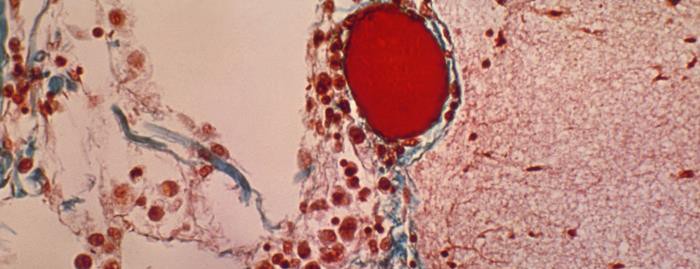
UC study: Cancer, COVID-19 and blood clots
UC researcher receives a grant to investigate how cancer therapy could impact COVID-19 patients
University of Cincinnati researchers and physicians are learning that COVID-19 impacts more than just the lungs. The list of potential issues multiplies when doctors also consider its impact on patients with other underlying conditions or the medications used to treat those conditions.
Shuchi Gulati, MD, UC assistant professor of medicine, UC Health oncologist and member of the UC Cancer Center, is one of the experts who is studying how treatments for patients with cancer and COVID-19 could cause other health complications, namely blood clots.

Shuchi Gulati, MD, assistant professor of medicine at the University of Cincinnati, a UC Health oncologist and member of the UC Cancer Center. Photo credit/Colleen Kelley/UC Creative + Brand
She recently received a $25,000 grant from the North American Thrombosis Forum to help her investigate this problem.
“Cancer itself can increase a patient’s risk of getting thrombosis,” she says. “Thrombosis is the formation of a blood clot within a blood vessel, and it prevents blood from flowing normally through the circulatory system. Researchers think this is because of tissue damage caused by some cancers which might trigger the blood clotting process. Now, blood clotting related to COVID-19 is emerging as a new complication related to infection.
“With this study, we will attempt to understand how treatments for cancer, specifically hormonal therapy and certain immunotherapies, involving use of the patient’s own immune system to fight cancer, could impact artery and vein blood clots in patients who have also been diagnosed with COVID-19.”
Gulati and researchers involved in the study will use a database called CCC19 (for COVID-19 and Cancer Consortium), the local arm of a global consortium of cancer centers and organizations that collects data about cancer patients infected with the coronavirus. The study will be conducted over the course of one year.
“This is the largest registry-based dataset to date recording outcomes of patients with cancer and COVID-19,” Gulati says.
In May, UC joined cancer centers like Vanderbilt-Ingram Cancer Center, Moffitt Cancer Center, Mayo Clinic Cancer Center as well as national organizations like the American Society of Clinical Oncology and more to participate in this database.
Gulati, who is currently in the Internal Medicine Scholarly Training for Academic Research Fellowship program at the University of Cincinnati College of Medicine, is excited to pursue this research with hopes it could prevent complications for millions of patients.
“By completing this project, we hope to contribute specific data regarding the thrombotic risk posed by being on specific treatments for cancer,” she says.
Featured photo of a blood clot courtesy of the Center for Disease Control photo gallery.
Impact Lives Here
The University of Cincinnati is leading public urban universities into a new era of innovation and impact. Our faculty, staff and students are saving lives, changing outcomes and bending the future in our city's direction. Next Lives Here.
Stay up on all UC's COVID-19 stories, read more #UCtheGood content, or take a UC virtual visit and begin picturing yourself at an institution that inspires incredible stories.
Related Stories
DAAPworks reveals 2025 Innovation Awards – discover the winning...
May 1, 2025
Visionary projects stole the show during DAAPworks 2025, from wayfinding technology for backcountry skiers to easy-to-use CPR training kits for children.
Everything you need to know about scents and your hair
May 1, 2025
The University of Cincinnati's Kelly Dobos was featured in an NBC News article discussing the science behind hair fragrances and shampoos.
Machine learning brings new insights to cell’s role in...
April 30, 2025
Researchers led by the University of Cincinnati’s Anna Kruyer and the University of Houston’s Demetrio Labate have published research in the journal Science Advances applying object recognition technology to track changes in brain cell structure and provide new insights into how the brain responds to heroin use, withdrawal and relapse.
